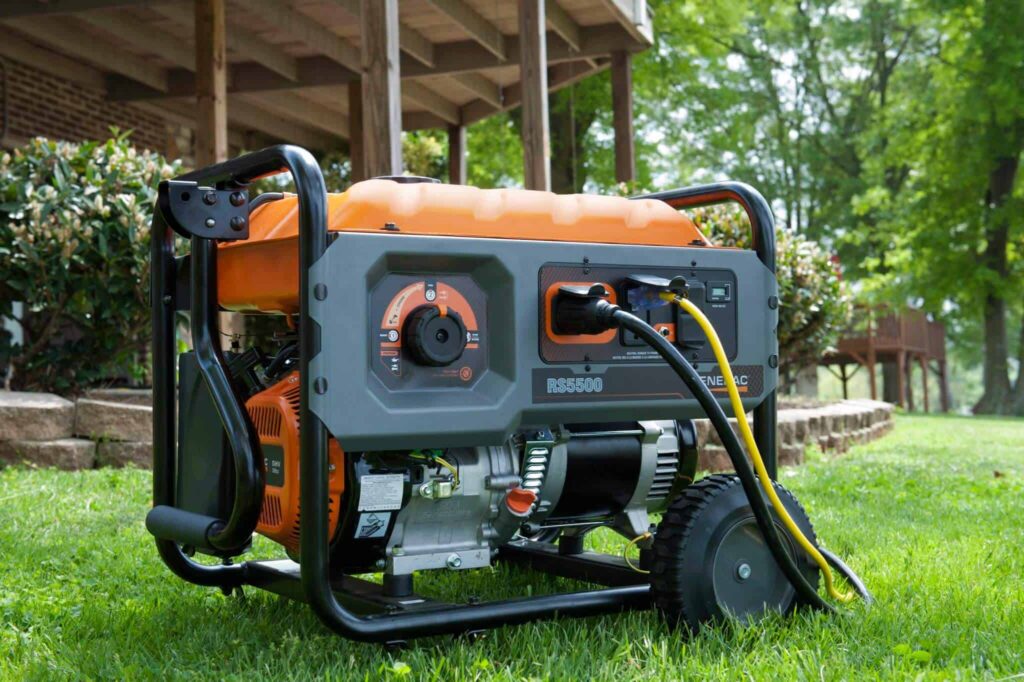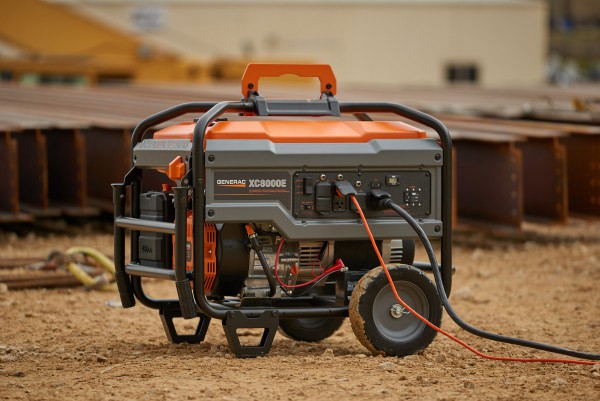A generator is handy to have in case of a power outage during a storm. You can permanently install one or use a portable generator. Handling a generator can be dangerous, so you should know how to use a generator safely
However, a generator can cause problems when you don’t understand how to use a generator safely. It can cause Carbon Monoxide poisoning, electric shocks or electrocution, and fires during refuelling. There are seven tips that you should follow to use a generator safely.
Why You Need to Know How to Use a Generator Safely
 You can land yourself in a few dangerous situations when you don’t know how to use a generator safely. There are main three hazards that a generator can cause:
You can land yourself in a few dangerous situations when you don’t know how to use a generator safely. There are main three hazards that a generator can cause:
Carbon Monoxide Poisoning: The fumes from the engine exhaust give off carbon monoxide. This poisonous gas can make you feel faint, dizzy, and sick. Breathing Carbon Monoxide can even cause serious medical problems, so you should see a doctor.
Fire: A generator may catch fire if it hasn’t been properly maintained or doesn’t have a circuit breaker.
Electric Shocks/Electrocution: Generators can cause electric shocks or electrocution when they get wet. You can experience electric shocks if the cable’s insulation is worn out if the generator isn’t grounded
How to Prevent Carbon Monoxide Poisoning
Carbon Monoxide (CO) is an odourless, colourless, and tasteless gas. If your engine exhaust fumes contain it, you won’t notice it right away. However, if you feel sick or dizzy, leave the generator room instantly. Then, go outside to take in some fresh air. If you are still feeling sick, go, and see a doctor.
Follow some of these tips to control Carbon Monoxide accumulation in your generator room since your engine is bound to release Carbon Monoxide.
Place Your Generator Outdoors
It’s a good idea to keep the backup generator outside your house, like in your garden, etc. Try to keep it away – at least 15-20 feet – from the windows so that Carbon Monoxide will not come into your house. Never keep a generator inside the house.
Use Carbon Monoxide Alarms
Installing Carbon Monoxide alarms is another option, and you can use battery-operated ones. The Carbon Monoxide alarms are a practical precaution and will tell you when the Carbon Monoxide levels get too high. You can install them near the generator and a couple of other places in the house to be on the safe side.

How to Prevent a Generator Fire
There are a few reasons why a generator can catch fire, and you need to understand the causes so you can prevent the catastrophe. To stay safe, you should learn how to use a generator safely.
Poor Refueling Ethics
Never refuel while the generator is running. Adding fuel while the generator is running can cause a fire to break out. When you need to refuel the generator, you should first turn off the generator. Then, let it cool off for at least 10 minutes. Cool the generator for more time if it’s hot outside.
Secondly, if you overfill the fuel tank, the fuel will expand and spill out from the fuel tank. Then, it will fall on the hot engine and ignite a fire. Only fill your tank up to 80%-85% so that there is space inside for the fuel to expand.
No Circuit Breaker
A generator has a fixed starting and running watts of power. If you run a generator past its runtime, the generator will start to overheat. A generator can overheat when it has exceeded its standard running power.
A generator can also overheat when you place it in a small, enclosed area or if the weather is hot. Allow it to cool at regular intervals if it gets hot. You can also install an exhaust near the generator.
Proper Maintenance
Maintaining and replacing the parts of the generator is important to prevent a sudden, explosive fire. When the parts (armature, commutator, and brushes) become old or experience wear and tear, they can spark. This spark can cause the fuel to spill out from the tank, leading to a fire.
You should make sure that all equipment is in good condition. You need to make sure that no wires, especially the generator extension cord, are worn out. If they are, it can lead to electric shocks and even fires.
How to Prevent Electrocution or Electric Shock
 A generator that runs on electricity and electrical equipment poses the threat of electric shocks and even electrocution. You can prevent electric shocks if you follow a few safety tips.
A generator that runs on electricity and electrical equipment poses the threat of electric shocks and even electrocution. You can prevent electric shocks if you follow a few safety tips.
Keep Generator Dry
If your generator is in a place where water can drain, this can cause you to experience electric shocks. Never touch a generator with wet hands, and try not to use a generator in wet weather. Place the generator under a canopy-like shelter to keep it safe from the rain.
Ground Your Generator
When a generator is grounded properly, excess electricity will flow through the least resistance path – the grounded/earthed path. It will provide the electricity with a backup path to flow into if the generator overloads or short circuits.
However, if your generator isn’t grounded, electricity will flow into any low resistance path it will find when the load becomes excessive. It may even flow into the wrong places and cause electric shocks or even electrocution.
Closing Thoughts
Generators are a necessity if your area experiences power outages in storms, etc. However, they can lead to hazards such as Carbon Monoxide poisoning, electric shocks, and even fires. To operate generators safely, you need to know how to use a generator safely.
Never touch a generator with your bare hands or let water near it. Use Carbon Monoxide alarms, place a generator outside, do proper maintenance, refuel the generator with care and install circuit breakers with your generator. If you understand how to use a generator safely, it will make your life easier and safer.